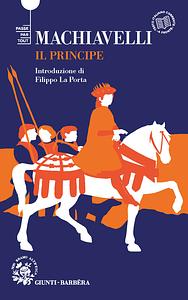You need to sign in or sign up before continuing.
Take a photo of a barcode or cover
Can't tell why this gets such a bad rap, considering the time when it was written. The writing style is decent and accessible, even though the topic itself is controversial. It's a realpolitik book and while I wouldn't recommend applying its teachings to the letter in today's society, I do agree that there is plenty to be kept in mind from Machiavelli's writing. Realpolitik world and all that.
MAY 3
Once upon a time, in a land called Italy, a young prince became of age. Once he had turned 18, the subjects of the kingdom threw him parties and parades. They sang his name in the streets. They bowed and threw him flowers. He was a very happy prince.
One day, a kingdom on the other side of the mountains fell to a conquering nation. This was bad news for this prince. It had never occurred to him in his sheltered life that kingdoms could belong to someone else. His kingdom had always been in his family. It would always BE in his family. This event showed the prince that he could, if he wasn’t careful, lose his kingdom too.
One day, when wandering through his library, he picked up this book THE PRINCE. He chose it because it was small and it seemed like it would be easy to read. He also once lost embarrassingly at a game of Trivial Pursuit because he didn’t know anything about this book. In addition to having the winner of the game executed, he also took this opportunity to read it for himself.
Our prince wasn’t particularly exceptional. So he is to be excused for thinking A) THE PRINCE was a story that also had a princess in it, and maybe even a wizard or a dragon and B) that it was a story about himself. He was wrong on both counts.
As he started to read, he got very frustrated with all of the references to ancient Greek and Roman armies. “Old guys!” he said and threw the little book across the room, and then picked it up and skimmed ahead looking for an actual fight scene.
There wasn’t one.
As he carried this little book around the castle, he realized that some of the members of court noticed he was carrying it. When he allowed them to speak, they said things like, “What an interesting choice, Your Highness.” Or, “I read that in high school.” Or, “Heh, heh, should we tell your father that you’re getting some good ideas?” And then the head advisor said to the young prince, “It’s about time. When you’re ready, I’ll discuss this book with you. It will change everything.”
So the prince finished the book and realized with some sadness that there never was a story in it. But instead of finding another book to impress the court with, he just started over at the beginning of this one.
But this time he underlined a few passages.
At the third reading, he hired his court magician to make him a stylus that had a bright yellow ink flow out of the end of it. The stylus was called a highlighter. With the book and the passages underlined with the magical stylus, the Prince felt himself growing wiser.
And more paranoid.
As it happened, two events occurred that fall that changed the young man’s life forever. The first was the growing threat by the Spanish (it could have been the French, or maybe it was the Swiss — the Prince had never paid attention to these groups before and it was hard for him to keep them straight.) The Western borders were not as secure as they once had been and someone had to do something about it.
But that someone was the King, the Prince’s father, and he was dying. The Prince, had been, up to now, just a child and matters of state were never even on his radar. (Of course radar hadn’t been invented yet. You know what I mean.) But now that the Prince had a little bit of knowledge about leadership, he felt like he could at least ask a few questions of the advisors, especially since the King was dying and no one really had a clue as to what to do next.
The Prince asked the first advisor if they were sending out a standing army or a group of mercenaries to protect the problem areas. The first advisor patted him on the head and told him he should go to the courtyard and practice archery.
The Prince asked the second advisor if the peasants on these border lands were well equipped to fight an invading army or had the King taken all their weapons? The second advisor tut-tutted and told the Prince to go the library and find a book about rabbits. Rabbits, he said, are nice.
The Prince then, angry, frustrated and probably way too sure of himself, asked the head advisor, “Is it better to be feared? Or is it better to be loved?”
At the hearing of this question, the head advisor clapped his hands together and took the Prince to an inner hidden office.
The head advisor sat the Prince down in a chair and pulled from hidden closets hundreds of documents, books, maps and charts showing the exact political situation of this little kingdom. For hours, the head advisor explained every problem, every strategy and every conceivable possibility for keeping the kingdom intact, keeping the subjects content enough, and how grow the country’s reputation from being a soft, wimpy girly nation to a strong, conquering one.
Before the head advisor was finished, in the wee hours of the morning, there was a knock at the door. A page whispered something in the head advisor’s ear.
“The King was dead.”
Before the head advisor had repeated the message to the Prince, the Prince plunged his dagger into the heart of the advisor. He gathered up all of the papers, documents and charts, carried them to the King’s Royal Study and locked the doors behind him.
In one week, the Prince was coronated as the new King. At the celebration feast, he had all of his father’s advisors and nearly all of the court (except for the prettiest girls) poisoned. He made a grand announcement to his subjects that he would take away their livelihoods and raise taxes if they displeased him. In the first few months of his reign, he executed any who opposed him.
The altercation at the border was eventually resolved with the retreat of that foreign army, whomever they were and the army of this little nation grew stronger and stronger.
And while life was kind of miserable in the little kingdom for the everyday people, the Prince, who was now the King (and had plans to become Emperor) lived happily ever after.
Once upon a time, in a land called Italy, a young prince became of age. Once he had turned 18, the subjects of the kingdom threw him parties and parades. They sang his name in the streets. They bowed and threw him flowers. He was a very happy prince.
One day, a kingdom on the other side of the mountains fell to a conquering nation. This was bad news for this prince. It had never occurred to him in his sheltered life that kingdoms could belong to someone else. His kingdom had always been in his family. It would always BE in his family. This event showed the prince that he could, if he wasn’t careful, lose his kingdom too.
One day, when wandering through his library, he picked up this book THE PRINCE. He chose it because it was small and it seemed like it would be easy to read. He also once lost embarrassingly at a game of Trivial Pursuit because he didn’t know anything about this book. In addition to having the winner of the game executed, he also took this opportunity to read it for himself.
Our prince wasn’t particularly exceptional. So he is to be excused for thinking A) THE PRINCE was a story that also had a princess in it, and maybe even a wizard or a dragon and B) that it was a story about himself. He was wrong on both counts.
As he started to read, he got very frustrated with all of the references to ancient Greek and Roman armies. “Old guys!” he said and threw the little book across the room, and then picked it up and skimmed ahead looking for an actual fight scene.
There wasn’t one.
As he carried this little book around the castle, he realized that some of the members of court noticed he was carrying it. When he allowed them to speak, they said things like, “What an interesting choice, Your Highness.” Or, “I read that in high school.” Or, “Heh, heh, should we tell your father that you’re getting some good ideas?” And then the head advisor said to the young prince, “It’s about time. When you’re ready, I’ll discuss this book with you. It will change everything.”
So the prince finished the book and realized with some sadness that there never was a story in it. But instead of finding another book to impress the court with, he just started over at the beginning of this one.
But this time he underlined a few passages.
At the third reading, he hired his court magician to make him a stylus that had a bright yellow ink flow out of the end of it. The stylus was called a highlighter. With the book and the passages underlined with the magical stylus, the Prince felt himself growing wiser.
And more paranoid.
As it happened, two events occurred that fall that changed the young man’s life forever. The first was the growing threat by the Spanish (it could have been the French, or maybe it was the Swiss — the Prince had never paid attention to these groups before and it was hard for him to keep them straight.) The Western borders were not as secure as they once had been and someone had to do something about it.
But that someone was the King, the Prince’s father, and he was dying. The Prince, had been, up to now, just a child and matters of state were never even on his radar. (Of course radar hadn’t been invented yet. You know what I mean.) But now that the Prince had a little bit of knowledge about leadership, he felt like he could at least ask a few questions of the advisors, especially since the King was dying and no one really had a clue as to what to do next.
The Prince asked the first advisor if they were sending out a standing army or a group of mercenaries to protect the problem areas. The first advisor patted him on the head and told him he should go to the courtyard and practice archery.
The Prince asked the second advisor if the peasants on these border lands were well equipped to fight an invading army or had the King taken all their weapons? The second advisor tut-tutted and told the Prince to go the library and find a book about rabbits. Rabbits, he said, are nice.
The Prince then, angry, frustrated and probably way too sure of himself, asked the head advisor, “Is it better to be feared? Or is it better to be loved?”
At the hearing of this question, the head advisor clapped his hands together and took the Prince to an inner hidden office.
The head advisor sat the Prince down in a chair and pulled from hidden closets hundreds of documents, books, maps and charts showing the exact political situation of this little kingdom. For hours, the head advisor explained every problem, every strategy and every conceivable possibility for keeping the kingdom intact, keeping the subjects content enough, and how grow the country’s reputation from being a soft, wimpy girly nation to a strong, conquering one.
Before the head advisor was finished, in the wee hours of the morning, there was a knock at the door. A page whispered something in the head advisor’s ear.
“The King was dead.”
Before the head advisor had repeated the message to the Prince, the Prince plunged his dagger into the heart of the advisor. He gathered up all of the papers, documents and charts, carried them to the King’s Royal Study and locked the doors behind him.
In one week, the Prince was coronated as the new King. At the celebration feast, he had all of his father’s advisors and nearly all of the court (except for the prettiest girls) poisoned. He made a grand announcement to his subjects that he would take away their livelihoods and raise taxes if they displeased him. In the first few months of his reign, he executed any who opposed him.
The altercation at the border was eventually resolved with the retreat of that foreign army, whomever they were and the army of this little nation grew stronger and stronger.
And while life was kind of miserable in the little kingdom for the everyday people, the Prince, who was now the King (and had plans to become Emperor) lived happily ever after.
informative
reflective
medium-paced
challenging
informative
inspiring
medium-paced
informative
slow-paced
dark
reflective
medium-paced
challenging
informative
inspiring
slow-paced
challenging
reflective
slow-paced
It is to be observed, men are either to be flattered and indulged, or utterly destroyed.
Machiavelli's 'The Prince' is a treatise on how an Italian Prince would go about gaining and maintaining political power, through tactics that would commonly be considered underhand or amoral by most people with a conscience. Consequently, they're tactics we see employed quite commonly by today's political leaders. It's a collection of Machiavelli's ideas on several topics pertinent to politics during the Renaissance era, and while on the surface level it doesn't seem too applicable to modern society, if you dig a little deeper you'll find that most of the key concepts are still present in politics today.
I went into this book knowing very little about it, other than the fact that it was a foundational text of political philosophy. I think not knowing much about it was to my detriment, a little. It took me a couple of chapters to figure out how to break apart the layers of this text to get to the deeper meaning, as everything is buried under centuries of context that needs to be picked apart. While all of the examples that Machiavelli brings up didn't really mean much (especially when talking about cavalries and principalities, as the notion of nation-states has changed), the core of his ideas remains unchanged and understandable. This is not a book to be read passively; you have to actively work at understanding it to gain anything from it.
I have lots of mixed feeling about this book. One one hand, it was certainly an interesting and insightful look into political philosophy during the Renaissance. On the other hand, if you're not reading this actively and purposefully, it's incredibly dense and quite boring. The writing style takes some getting used to, and a lot of concepts are presented in a way where it's sometimes hard to tell what Machiavelli's true point actually is.
Let's get one thing out of the way: this is not a how-to book. It looks like it on the outside, but it's not. Machiavelli actively disregards the notion of morals and ethics in terms of political philosophy. In my opinion, his main point is not that "anything and everything is acceptable as long as you come out on top". It's that "concepts such and morality and ethics can be disregarded by political leaders for maximum efficiency in political endeavors".
I think, if I reread this in a couple of months, with the intention of actively studying this and picking apart the main ideas and concepts here, this could be a very useful book in teaching oneself how to recognise underhanded political tactics, when they are being used, and how to prevent them. Undoubtedly, my opinion on Machiavelli's philosophy will change. But until then, this is what I've got in terms of analysis.
N.B. I found Machiavelli's take that "a Prince should constantly be thinking about war" very funny.
A Prince, then, is to have no other design, nor thought, nor study but war and the arts and disciplines of it.
Good stuff!
challenging
reflective
medium-paced
informative
reflective
medium-paced







